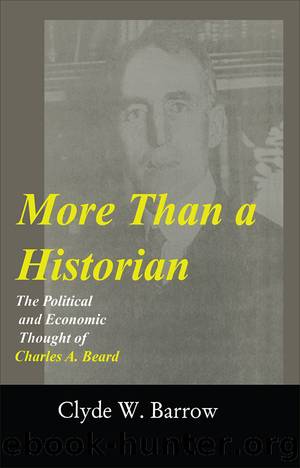More than a Historian by Clyde Barrow

Author:Clyde Barrow [Barrow, Clyde]
Language: eng
Format: epub
ISBN: 9781138512351
Google: cc1_swEACAAJ
Publisher: Taylor & Francis Group
Published: 2018-02-05T01:32:28+00:00
5
The Workersâ Republic
It has never been easy to interpret the work of Charles A. Beard using traditional ideological categories from either American or European political thought. Political theorists and intellectual historians have identified Beard as both a Jeffersonian and a Hamiltonian. Others have described him as a Progressive, a liberal, a corporate-liberal, a Tory-radical, and a Marxian socialist.1 Notably, with the exception of those few scholars misguided enough to view Beard as a Jeffersonian, most students of Beardâs political thought have defended their claims by pointing to Beardâs growing enthusiasm for a planned economy during the 1930s. However, as George Soule noted early in the controversies over Beardâs work, the concept of planning was an omnibus word during the 1930s that was given âa different content by any number of its advocates, practitioners, and opponents.â In a political sense, the concept was attractive during the decade because it vaguely denoted oneâs opposition to laissez-faire capitalism without âinvolving the proponent in endless arguments about specific panaceasâ for the Great Depression.2 In substance, therefore, discussions of economic planning during this period included everything from Wilsonian liberalism to communism and fascism. Thus, it is no surprise that previous efforts to locate and evaluate Beardâs work on the basis of this concept have never proven wholly satisfactory. Furthermore, Beard made little effort to clarify this ambiguity in most instances, since he frequently referred to his conception of a planned economy as industrial democracy or collectivist democracy.
Thus, in lieu of any clear statement to the contrary, political theorists and intellectual historians have largely accepted Harold Laskiâs early assessment of Beardâs political thought. In a collection of essays that provided the first systematic attempt to evaluate Beardâs legacy to American political thought and historiography, Laski claimed that Beard âhas never drawn conclusions of a Marxist, or, in any decisive way, even a socialist characterâ¦.Beard is a collectivist, but not a socialist.â3 Bernard Boming followed this lead in the first and only book devoted entirely to a reconstruction of Beardâs political and social thought, by observing that Beard was inclined only toward âa modified form of âcapitalist democracyâ.â4 More recently, Raymond Seidelman has echoed these earlier claims with his conclusion that Beard merely âwanted to extend the scope and range of collectivist-style reformsâ adopted during the New Deal, but Seidelman agrees that Beardâs ideas were âhardly socialist.â5 Indeed, since his death in 1948, most analyses of Beardâs political and historical thought have located his ideas somewhere within the vague progressive spectrum of an emerging New Deal liberalism.6
By contrast, Ellen Nore is perhaps the only contemporary scholar to challenge the dominant interpretation of Beardâs political thinking with her suggestion that Beardâs programmatic proposals for economic and constitutional reform were actually far left of the New Deal. Nore argues that in contrast to the New Deal liberals: âBeard did not want to save capitalism, but rather to go beyond it to a new systemâ and, in this respect, she insists that âBeard was very sympathetic to socialism.â7 Indeed, when
Download
This site does not store any files on its server. We only index and link to content provided by other sites. Please contact the content providers to delete copyright contents if any and email us, we'll remove relevant links or contents immediately.
The Secret History by Donna Tartt(19089)
The Social Justice Warrior Handbook by Lisa De Pasquale(12190)
Thirteen Reasons Why by Jay Asher(8910)
This Is How You Lose Her by Junot Diaz(6887)
Weapons of Math Destruction by Cathy O'Neil(6281)
Zero to One by Peter Thiel(5802)
Beartown by Fredrik Backman(5754)
The Myth of the Strong Leader by Archie Brown(5508)
The Fire Next Time by James Baldwin(5446)
How Democracies Die by Steven Levitsky & Daniel Ziblatt(5219)
Promise Me, Dad by Joe Biden(5153)
Stone's Rules by Roger Stone(5088)
A Higher Loyalty: Truth, Lies, and Leadership by James Comey(4964)
100 Deadly Skills by Clint Emerson(4925)
Rise and Kill First by Ronen Bergman(4789)
Secrecy World by Jake Bernstein(4753)
The David Icke Guide to the Global Conspiracy (and how to end it) by David Icke(4720)
The Farm by Tom Rob Smith(4513)
The Doomsday Machine by Daniel Ellsberg(4490)
